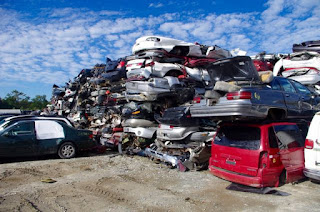There has been lots written over the years about green parts and their use within the vehicle repair industry, and many attempts have been made over time to bring green parts into mainstream use in the UK Vehicle Repair sector.
The product isn’t “sexy”; it is boring and often misunderstood, so we need a clearer understanding about the recycling of vehicle parts in today’s marketplace.
Green Recycled Parts have many advantages including environmental and cost savings, and don’t forget these parts were designed by the vehicle manufacturer and fitted on their production lines, so they are a quality product.
Many drivers and owners insist on new parts for their vehicle - that is their choice - but no matter how old their vehicle is, they are still driving a used vehicle so where is the benefit of brand new, original equipment parts that could be 3 times the cost of a quality green recycled part from a professional vehicle recycler?
There are many scrapyards out there, and not many professional vehicle recyclers - they are not the same!
Professional vehicle recyclers buy damaged or salvage vehicles from a variety of sources, they inspect each vehicle, inventory the quality green parts that can be re-used, de-pollute the vehicle to very high standards, dismantle the vehicle and store the removed parts ready for re-sale. They are able to tell every customer where the component came from, the age of the vehicle, mileage, the quality of the part and much more. Many scrapyards cannot do this!
Used Parts Recycling Networks are an elite group of auto recyclers who operate best management practices and strive for perfection in everything they do, and this includes supplying the best quality green recycled parts for the vehicle repair industry.
These Recycling Networks acknowledge a number of factors. including:
Speed of repair. This has now become an important standard for all UK insurers, and the use of green parts can slow down this process so recyclers are challenged to get green parts price and availability to vehicle repairers in minutes rather than hours.
Loss of Revenue. Vehicle repairers cannot lose any revenue by doing this, so parts discounts will be similar to main dealer discounts available.
Additional Labour. It is acknowledged that there may be additional labour required when fitting a green recycled part - this could be due to the green part being a different colour to the original or some minor paint damage requiring re-work - and allowances need to be made to the vehicle assessment to reflect this.
This all means that auto recyclers need some guidance to help them price their green recycled parts and make them cost effective for vehicle repairers and work providers to consider, which is where professional Recycling Networks can assist and help members sell more quality Green Parts into the vehicle repair industry.
Are we on the brink of a revolution in how vehicles are repaired in the UK? Will we see an increase in the use of Green Recycled Parts in 2016? Do you want to be part of this revolution and sell more quality green recycled parts in 2016?
If you want to be part of this revolution, then contact Reco Auto through their web site (www.recoauto.com) and become part of their recycling network - they can’t promise instant parts requests, but they can promise that you will be part of a revolution that is changing how UK insurers and UK vehicle repairers complete vehicle repairs in the future.









